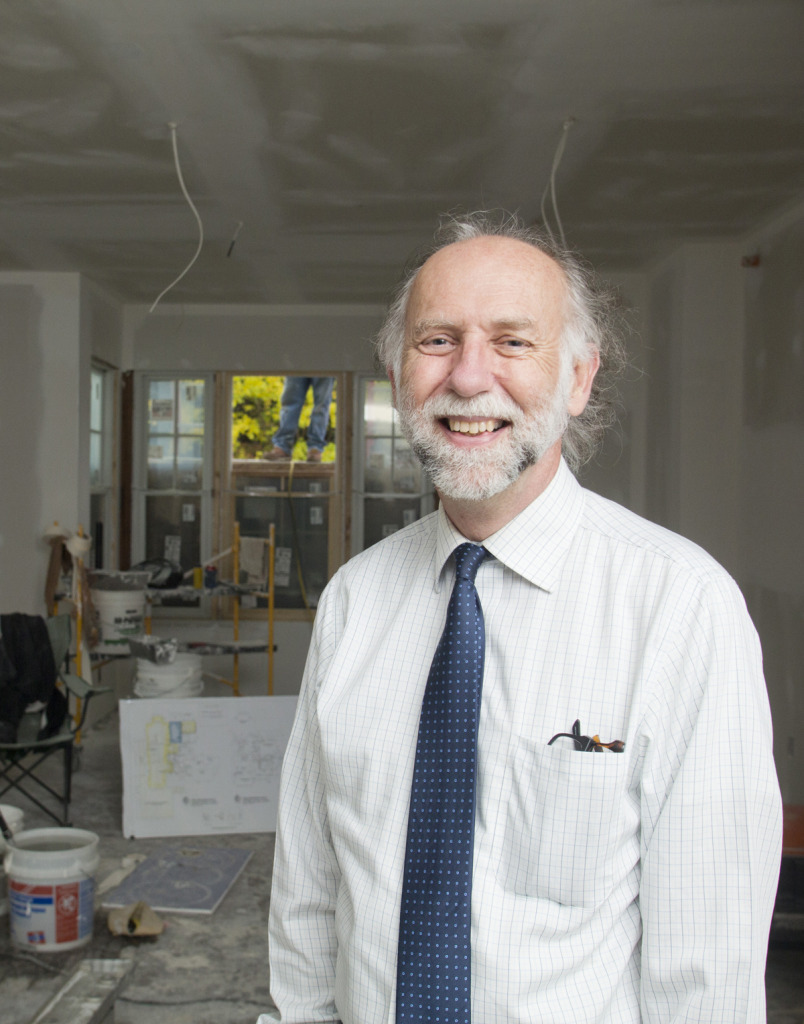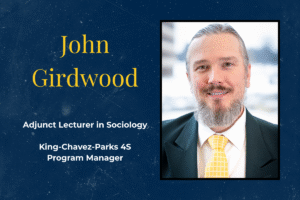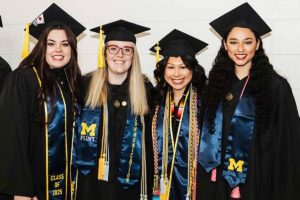After years of dedication and service to the University of Michigan-Flint, four members of the College of Arts and Sciences were recognized by Chancellor Borrego at a Retirement Reception on December 8th.
Our CAS retirees are:
• Dr. Thomas Foster of the English Department
• Dr. Richard Hill-Rowley of the Earth & Resource Science Department
• Ann Niemann of the Biology Department
• Dr. Paul O’Donnell of the Department of Foreign Languages and Literatures
Read more about these dedicated members of the College of Arts and Sciences:

Dr. Thomas Foster
Per Dr. Stephen Bernstein, Chair of the English Department
Professor Foster received his B.A. degree with high distinction from Dartmouth College in 1974, his M.A. degree from Michigan State University in 1977, and his Ph.D. degree from Michigan State University in 1981. From 1981-82 and 1983-87 he served as temporary assistant professor in Michigan State University’s American Thought and Language Program, and in 1982-83 he was an assistant professor at Kalamazoo College. He joined the University of Michigan – Flint faculty in 1987 as assistant professor.
For twenty-seven years Professor Foster was a popular instructor in a wide array of courses for undergraduates and graduate students. His courses ranged from introductory courses in classical literature and literary genres all the way to upper-level and graduate classes on modern and contemporary British literature. Hundreds – if not thousands – of students owe at least part of their understanding of some of the twentieth century’s greatest writers to Professor Foster. He served on numerous department and university committees, and was instrumental in the establishment of the English Department’s Master of Arts in English Language and Literature in 2007. He then served as the program’s first director, designing numerous policies and procedures for its continuing success over the five years of his tenure.
Aside from his fine work as a teacher and an administrator, Professor Foster was also a tireless researcher and writer. He was the author of many academic articles and of eight books, some written for academic audiences and some for the general reader. His How to Read Literature Like a Professor became a bestseller, and Professor Foster spent many hours talking with high school classes who had read the book, visits that made him a de facto ambassador for higher education.
The Regents now salute this distinguished literature educator for his dedicated service by naming Thomas C. Foster professor emeritus of English.

Dr. Richard Hill-Rowley
Research Interests: Land Use, Sustainable Urbanism, and Urban Redevelopment
Dr. Hill-Rowley is retiring from the Earth & Resource Science Department. In recent years, he was the driving force behind the Urban Alternatives House – an energy efficient structure designed to use water and other resources in a sustainable way. The house is both a living and a learning space with classroom facilities and apartments located within. In October 2014, the ERS celebrated the Urban Alternative House’s LEED Platinum Certification–the highest certification of the U.S. Green-Building Council.
Professor Hill-Rowley received his B.Sc. degree in Economics from the University of London in 1969, his M.A. degree in Geography from University of Georgia in 1973, and his Ph.D. degree in Geography from Michigan State University in 1982. From 1975 to 1981 he was Research Specialist and Project Manager for the CRIES Project, Important Farmlands Mapping Project and the Remote Sensing Project at Michigan State University. In 1982 he came to the University of Michigan-Flint as an instructor and was hired as an Assistant Professor in the Department of Earth and Resource Science in 1983. In 1989 he was promoted to Associate Professor in the Department of Earth and Resource Science. While at UM-Flint he also served as the Director of the Regional Groundwater Center, UM-Flint (1990-1998) and Director of the Center for Applied Environmental Research, UM-Flint (1998-2000).
Richard was among the early core faculty in the years when the Department was known as Resource and Community Science and was largely responsible in the formation and growth of the department and programs into what has become the Department of Earth and Resources Science. Professor Hill-Rowley was a leader in classroom teaching, faculty development, and was an active researcher. He was active in faculty governance in the department, college, and University. As a scholar, Richard produced several significant publications in the areas of forest management and sustainability, and was an early pioneer in implementing a full on-line course at the UM-Flint.
Professor Hill-Rowley’s exceptional achievements are related to his service and applied research, and these include: helping to obtain significant amounts of grant money to fund the newly formed Regional Groundwater Center; establishing the transfer of scientific knowledge to many communities about their groundwater and potential contamination risks to their wells; and, creating an environmental component to the UM-Flint campus outreach efforts. His signature achievement, however, was creating a vision for an energy and water efficient home located near the campus to serve as a model for the surrounding community and region, This vision was implemented in 2013 after 5 years of tireless work that brought together local community organizations, campus faculty and staff, student assistants, and a diverse set of funding organizations including the Mott Foundation, Flint Rotary Club, Kresge Foundation, and Consumers Energy. Today, the UAH stands as the only house of its type affiliated with a U.S. university that blends a classroom seating 25, energy and water efficient monitory systems, a working garden, rain harvesting system, and live-in low-income qualified tenants. This structure is truly a lasting resource for the entire University, community, and region.

Ann Niemann
Per Dr. Steve Myers, Chair of the Biology Department:
Ann was originally hired on February 21, 1989 as a part-time secretary for the Theater and Dance Department chaired at the time by Dr. Thomas Bloom. Ann enjoyed many theatre and dance productions during her 14 ½ years there. She was able to see the production process from beginning to the opening night – many hours of practice, behind the scenes work involving the set, and costumes in each of their productions. One of her jobs there she will never forget was the season brochure bulk-mailing every summer.
In August of 2003, Ann was one of approximately 20 UM-Flint employees who received word in August of 2003 of job cutbacks. She was called back to work part-time in the Philosophy Department in December 2003.
In the fall of 2004, she transferred to Biology Department, which became much more than her home department. Right from the start, the biology department appreciated Ann as the great asset she was.
Her appointment in biology included serving as a “floating secretary” within CAS for three months during summer. This gave Ann the unique opportunity to experience operations in a wide range of departments (e.g. MUS, COM/ART, ECN/AFA, POL SCI/PUB ADM, FOR, CSEP, CHM/ERS, MTH, PSY, SOC/ANT/CRJ, and THE). Ann enjoyed meeting new people and brought back to the biology department many new ideas to enhance office operations.
While Ann enjoyed working with people across the college, she was always very happy to return to the biology department where she felt most at home. The biology department recognized what a gem Ann was. She has a wealth of knowledge about the university that made her a great resource person. She also was very much a people person who brightened the office and made all who entered feel welcome. Ann was amazing at multitasking. She often was the first contact for anyone entering the Biology office and, as this [is] a very busy department, she endured regular interruptions as a matter of course. Ann astounded many, especially her department chair, with her ability shift her full attention quickly to help a student or faculty member and then quickly shift her attention back to her other multitudinous tasks. Over the years, Ann demonstrated that she was dedicated to the success of our students, the department and the college.
The biology department whole heartedly thanks Ann for her many years of exemplary service and wish her all the best in her retirement.
Dr. Paul O’Donnell
Professor Paul O’Donnell begane at the University of Michigan-Flint in 1986. He was awarded tenure in 1991 and promoted to full professor in 1997. He taught in the Department of Foreign Languages and Literatures, teaching Spanish.




